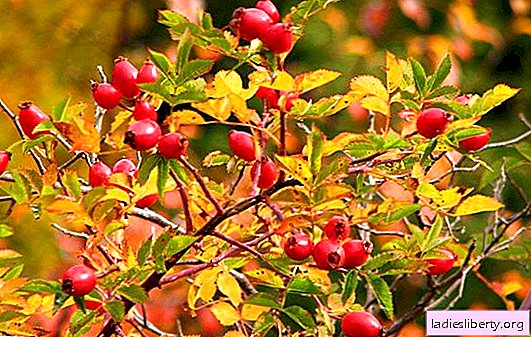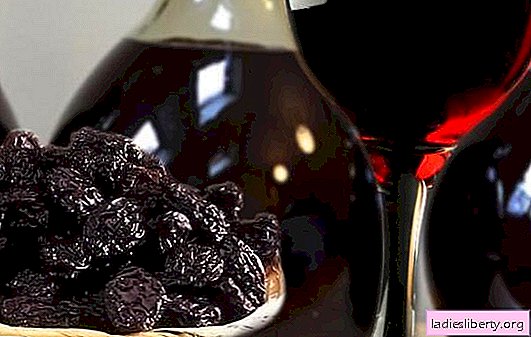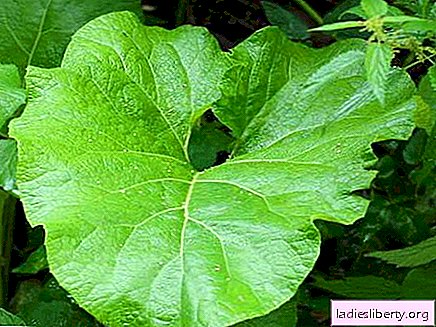
Rosehip, the beneficial properties of which are the reason for the popularity of this plant in medicine, also called "wild rose". The Himalayas and Iran are the birthplace of a plant with beneficial properties.
In traditional medicine, hips are used, and in folk medicine hundreds of recipes are known, for which they use fruits, stems, flowers, and roots of this miracle plant.
Interesting facts about dogrose, composition and benefits that it brings to people
Rosehip flowers do not look particularly attractive, which can not be said about the delicate aroma that does not leave anyone indifferent. However, in this article, we will focus on the benefits and dangers of wild rose, which is popularly called the "healer of the forest."
Wild bush with healthy fruits for decorative purposes is rarely grown. It is mainly used for the preparation of medicinal decoctions, tinctures and ointments.
In ancient times, the dog rose was used in rituals, it was attributed to the ability to arouse passion, and folk healers used its fruits to heal wounds.
The value and benefits of wild rose are determined by the content of vitamin C, which is 10 times higher in the fruits of this plant than in black currant berries. Even the popular lemon gives hips to the content of this vitamin.
The high content of ascorbic acid automatically adds dogrose to the list of plants - natural antioxidants.
This bush is not only rich in vitamin C, because it also contains other vitamins: A, K, P, B2, E.
In the composition of wild rose are present:
• tannins;
• sugar;
• organic acids,
• phytoncides;
• essential oils;
• magnesium;
• iron;
• calcium;
• phosphorus;
• carotene;
• riboflavin;
• calcium salts.
However, it is worth noting that there are several varieties of wild rose, and far from all of them have useful properties. Scientists did not find anything useful in a dog horn, unlike Begger’s hip, the amount of ascorbic acid in which reaches 20%.
For those who are accustomed to count the number of calories consumed, the following information is useful: 100 g of dried fruit only 110 kcal. As for fats, their number is 0, 0 g, while the protein in it contains 3, 4 g, and carbohydrates - 21, 5 g
The health benefits of dogrose and indications
Among the features of the wild-growing bush that are beneficial for the organism, its bactericidal property deserves attention. In addition, drugs derived from this plant have proven themselves in the treatment of:
anemia;
avitaminosis;
arthritis;
diseases of the genitourinary system.
Ointments for external use facilitate the patient's condition with:
frostbite and burns of the skin;
dermatitis;
eczema;
trophic ulcers;
psoriasis.
Not everyone knows about rosehip oil, the benefit of which was felt by those who were brought to despair by skin diseases. It is this remedy that helps to get rid of the problems caused by trophic ulcers, dermatosis, bedsores. Oil with a high content of carotene heals abrasions and cracks.
Ointment from the ash of the wild rose stalks, used by patients for the treatment of psoriasis.
The roots of wild rose contain substances - tannins. Their antifungal, anti-inflammatory and hemostatic properties allow the use of decoction of the roots in the presence of stones in the kidneys and to normalize blood pressure.
Hips infusions prepared according to special recipes, whose health benefits are confirmed by science, treat gallstone disease. Also used to reduce the fragility of blood vessels, healing of abrasions and cracks in the skin. Their hematopoietic action allows the use of wild rose for bleeding.
Rosehip infusion - a proven remedy for the prevention of influenza. In combination with honey, it treats respiratory viral diseases and helps to avoid possible complications.
To normalize the work of the gastrointestinal tract with gastrointestinal disorders, during the day they drink the infusion of rosehips (10 g of dry berries per cup of boiling water). This tool also helps with kidney and liver, gallbladder and heart diseases. The use of wild rose infusion, the benefit of which for the organism, each assesses, guided by personal experience, contributes to the dissolution of stones and relieves pain.
Cooking broth on the steam bath of the hips, dried together with the seeds, does not take much time. But the benefits of such a tool is obvious. It helps with:
• bleeding;
• anemia;
• tuberculosis;
• infectious diseases.
In addition, this tool reduces the level of cholesterol in the blood and improves eyesight.
A decoction of the petals helps in the treatment of eye and erysipelas. Use it for lotions, with which you can get rid of the above problems.
How to cook broth hips
Treatment with hips, about the benefits of which for the liver, stomach, chronic ulcers, Avicenna wrote, depends largely on how well the healing broth is prepared. One of the methods of preparation of wild rose broth from the berries involves the following actions:
1. The berries are crushed, but the grains must remain intact.
2. Place in a saucepan and pour boiling water on the basis of one part of the crushed fruit into six parts of water.
3. Boil on low heat for 10 minutes.
4. After 2 hours you can drink the broth.
Thanks to this method of preparation, a maximum of useful substances is preserved, including 90% of vitamin C.
But there are other noteworthy cooking options:
1. Fruits are ground in a mortar.
2. Pour boiling water (10-15 g of crushed berries into a glass of boiling water).
3. Boil for 3 minutes and pour into a thermos.
4. Use after 3 - 3.5 hours, strain through cheesecloth.
It is recommended to drink broth in the intervals between meals of 50-100 ml, you can with honey.
When is a dog rose more harm than good? Contraindications
Despite the benefits of wild rose, its improper use can cause serious problems. Useful rosehip berries, at first glance seem to be quite harmless, but you need to use them carefully. This is especially true of those who suffer from gastritis with high acidity or gastric ulcer.
Prolonged use of wild rose tincture, especially concentrated, has a devastating effect on the teeth. Therefore, after drinking broth, infusion or rosehip tea, it is necessary to rinse your mouth with clean water.
The use of healing agents has a negative effect on the health of those who have heart disease and are prone to the formation of blood clots. Therefore, alcoholic liquors are categorically contraindicated for such people, which it is better to give up to everyone at all, because no rosehip is able to neutralize the effect of alcohol.
To minimize the chances of getting non-infectious jaundice, you should not get too carried away with dry fruits, decoctions, juices and tinctures based on them. Medicinal plants prepared on the basis of the root slow down the secretion of bile, and when constipated, decoctions from the components of this plant are contraindicated!
It is necessary to carry out treatment only with the permission of the doctor. But even having received the “good” of the therapist or the attending physician, it is worth remembering the sense of proportion, the neglect of which leads to negative consequences.
What is useful rosehip for pregnant and lactating mothers?
Since it is better for pregnant women and women during lactation not to use any medicinal chemicals unnecessarily, it is possible to use decoctions of rosehip to replenish the nutrients in such a delicate period.
It improves the elasticity of blood vessels, protects a woman's body from various infections, helps stimulate the endocrine glands, and has many other beneficial properties.
Vitamin drink from the fruits of "wild rose" restores the immune system. This is what pregnant women need most. Rosehip is not only used for the prevention of influenza and colds, but also helps to overcome them in the event that the problem could not be avoided.
Special contraindications to the use of pregnant and lactating not found. The recommendations are the same as for ordinary people: do not abuse and remember that excessive use affects tooth enamel in a negative way. Therefore, it is better to drink an infusion or decoction of rose hips through a straw, and if there is no such possibility, after a healing drink or tea, with the addition of dry berries of a wild-growing shrub, rinse your mouth with water.
Rosehip in the child's menu - the benefits or harm?
Pediatricians recommend introducing dogrose infusion into the baby’s diet, starting with
4 months. At the same time, you need to start with 5-10 ml, gradually increasing the dose to 100 ml.
The main benefit of this product is vitamin C, which is rich in wild rose. It has a tonic effect on the children's body and is recommended for children with:
vision problems;
hair loss;
anemia;
disorders of the liver;
gastrointestinal tract diseases;
dysbacteriosis and food poisoning.
In addition, the unique plant has antimutagenic properties and prevents the negative effects of harmful substances in the air, water, food and drugs.
Useful infusion of rose hips for children with a long stay in direct sunlight, which reduces the amount of vitamin C in the child's body.
With regard to contraindications, they are similar to those available for adults. Therefore, parents should control the amount of drinks (infusions, compotes, decoctions), in which rose hips are added.











